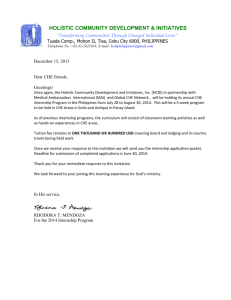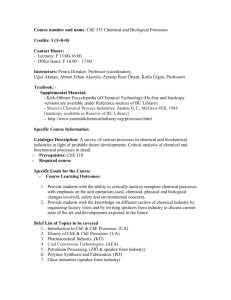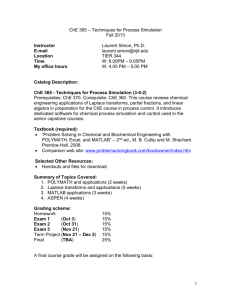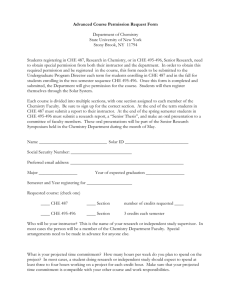The Chemical Engineering Licensure Exam
advertisement
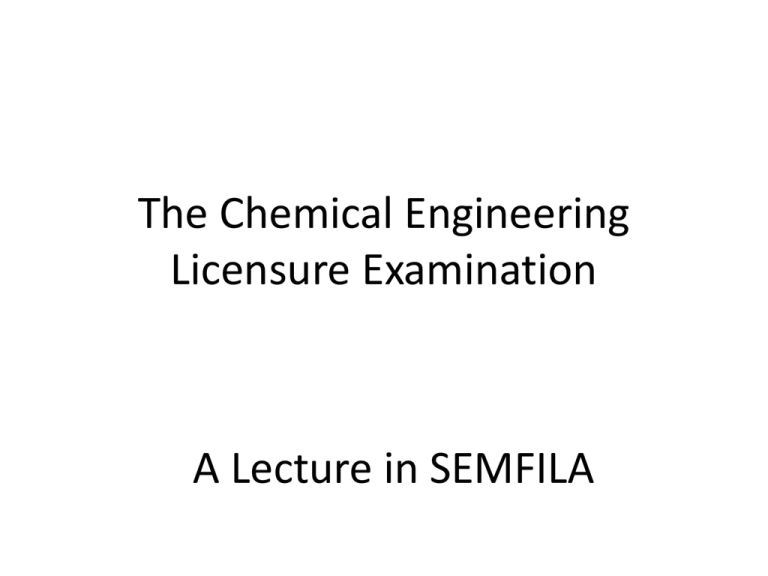
The Chemical Engineering Licensure Examination A Lecture in SEMFILA DESCRIPTION • The ChE Board Exam is an examination given to qualified applicants (according to R.A. 9297) by the Board of Chemical Engineering, in tandem with the Professional Regulation Commission (PRC), for the purpose of allowing chemical engineers to legitimately practice their profession. • All qualified applicants for registration for the practice of chemical engineering must take an examination as prescribed in R.A. 9297 to become registered and licensed. PRIMARY OBJECTIVE To test the overall knowledge and proficiency of the applicant for registration for the practice of chemical engineering CRITICAL ROLES The Board has the power, function, and responsibility to determine and prepare the contents of the chemical engineering licensure examination. CRITICAL ROLES The Commission has the power to administer and conduct, jointly with the Board of Chemical Engineering, licensure examinations according to the rules and regulations promulgated in the Rules and Regulations Governing the Regulation and Practice of Professionals. GUIDELINES for the CHE BOARD of EXAMINER • The areas covered by the examination shall be within the topics enumerated in the syllabus for the particular subject. • The questions and problems in any subject shall be comprehensive and well-balanced within the group of subjects in one day. GUIDELINES for the CHE BOARD of EXAMINER The questions and problems shall relate to matters that are of general applicability to the chemical engineering practice in the Philippines or to the general knowledge required of a chemical engineer. GUIDELINES for the CHE BOARD of EXAMINER Instructions and/or requirements in answering questions or solving problems shall be clearly stated in a concise manner so as not to confuse the examinees. GUIDELINES for the CHE BOARD of EXAMINER The Board Member shall input into the test questions bank at least five-hundred (500) questions for each subject as the starting point which has to be beefed up by at least three hundred (300) questions for every examination to arrive at the optimum three thousand (3000) questions or more. The questions deposited in the bank shall be withdrawable and replenishable with the new ones to meet the updated technological trends or changes in the profession. GUIDELINES for the CHE BOARD of EXAMINER The questions for deposit in the bank may come from those which the Board Member had formulated or from those which he/she had adopted from the academe with or without modification. GUIDELINES for the CHE BOARD of EXAMINER No questions shall be deposited in the bank unless it has been appraised as to its objectivity, validity, materiality, reliability, and efficaciousness. An expert on test construction may be consulted to assist the Board Member to fine tune every question to be deposited, to discern if the foregoing constraints or parameters have been met, to determine if every question is unambiguous or to find out if it is definite and only answerable with one definite correct answer - not with the “best” answer. GUIDELINES for the CHE BOARD of EXAMINER The questions for each subject to be deposited in the bank shall be classified as to its degree of comprehensibility: easy, average/moderate and difficult; to its level of knowledge (sound, adequate and fair) and proficiency (competent, adequate, and fair); and its nature: problem solving, essay, and objective (only multiple choices). GUIDELINES for the CHE BOARD of EXAMINER The number of questions to be given in the examinations shall be extracted from the bank and randomized so as to produce at least two (2) sets containing different chronological arrangements of questions for printing and distribution to the examinees and so as to prevent the examinees from copying the answers of their seatmates. GUIDELINES for the CHE BOARD of EXAMINER • Security measures shall be implemented to ensure that the computer programs and files are tamper-free. Multiple passwords shall be adopted so that no one is in complete control of, or has access to, the computer programs and files. Three (3) responsible key officials shall be designated for this purpose. • The correction and rating of test papers as well as the other stages of the results of the examination shall be computerized. CHE BOARD EXAM SCOPE PHYSICAL & CHEMICAL PRINCIPLES: – GENERAL INORGANIC CHEMISTRY: Matter and energy, theory of atoms and molecules, chemical periodicity, calculation principles in chemical changes, chemical bonding, solutions, chemical equilibrium, chemical kinetics, and nuclear chemistry. – ORGANIC CHEMISTRY: Structural characteristics and reaction mechanism of different organic compounds: aliphatic, aromatics, arenes, alcohols, ethers, aldehydes, ketones, carboxylic acids, carbohydrates, amino acids, and proteins and others. – ANALYTIC CHEMISTRY: Theory and practice of gravimetric and volumetric methods of analysis and their application methods in the analysis of acids, bases, salts, and minerals. – PHYSICAL PRINCIPLES: Properties of gases, liquids, solids and solutions; introduction to first and second laws of thermodynamics; thermochemistry; homogeneous and heterogeneous equilibria; transference and conductance of ionized solutions; and electrochemistry. – ENVIRONMENTAL ENGINEERING: Aspects of pollutants; physical, chemical and biological processes applicable to pollution control and abatement. CHE BOARD EXAM SCOPE GENERAL ENGINEERING: – MATHEMATICS: Algebra, Trigonometry, Analytical Geometry Differential Calculus, Integral Calculus, Differential Equations; Statistics and Probability Theory. – PHYSICS: Mechanics, waves, sound, heat, electricity, magnetism, and light. – ENGINEERING MECHANICS: Statics and dynamics; free body concepts; equilibrium of coplanar and non-coplanar systems; analysis of frames and trusses; friction; centroids and moments of inertia; motion of particles and rigid bodies; mass, force and acceleration; work and energy; impulse and momentum. – STRENGTH OF MATERIALS: Axial stress and strain, stresses in torsion and bending, combined stresses, beam deflections, indeterminate beams, and elastic instability including thermal expansion. – ENGINEERING ECONOMICS: Introductory financial accounting; financial mathematics: time value of money; capital investments decision criteria; and engineering oriented applications. CHE BOARD EXAM SCOPE CHEMICAL ENGINEERING: – CHEMICAL ENGINEERING CALCULATIONS: Elementary mass and energy balances (stoichiometry); principles of equilibrium applicable to unit operations and processes; materials and energy balances applicable to industrial processes, e.g., gaseous, liquid and solid fuels, sulfur, nitrogen compound, etc. – CHEMICAL ENGINEERING THERMODYNAMICS: First and second laws of thermodynamics, P-V-T relationships of fluids, heat effects, thermodynamics of flow processes, power and refrigeration cycles, phase equilibria, and chemical reaction equilibria. – REACTION KINETICS: Principles and applications of chemical kinetics to the design of chemical reactors. – UNIT OPERATIONS: Principles of fluid mechanics; heat; mass and momentum transfer; separation processes; stagewise operations. CHE BOARD EXAM SCOPE CHEMICAL ENGINEERING: – PLANT DESIGN: Application of physical and chemical principles in the design of industrial plants or parts thereof involving preparation of process flow sheets, mass and energy balances, and equipment design. – CHEMICAL PROCESS INDUSTRIES: Unit processes and operations involved in the inorganic and organic chemical industries. – BIOCHEMICAL ENGINEERING: Aspects of biological sciences, primarily microbiology and biochemistry, which are applicable to the biological process industries and of importance to environmental pollution control. – INSTRUMENTATION AND PROCESS CONTROL: Principles and operations of a wide variety of process instruments and the proper selection thereof for practical industrial application. – CH.E. LAWS CONTRACTS AND ETHICS: Legal and ethical issues related to the practice of chemical engineering including intellectual property and environmental laws. LICENSURE EXAMINATION & REGISTRATION 1. Requirement: all applicants for registration shall be required to pass the licensure examination 2. Schedule: twice a calendar year, prescribed by the Commission and conducted by the Board 3. Scope: Physical and Chemical Principles (PCP), General Engineering (GE), Chemical Engineering (ChE) LICENSURE EXAMINATION & REGISTRATION 4. Applicants must have the following qualifications: • citizen of the Philippines • good moral character • graduate of a school, institute, college or university recognized by the government • conferred with the degree Bachelor of Science in Chemical Engineering • has not been convicted of an offense involving moral turpitude by a court of competent jurisdiction LICENSURE EXAMINATION & REGISTRATION 5. Fees: For examination and for registration after passing, prescribed by the Commission 6. Report of Rating: • correction must be completed within 20 days from the last day of examination • ratings will be released not more than 30 days after the Board has completed the correction of the examination papers Certificate Of Registration & Professional Identification Card • shall be provided, upon registration, for applicants who received a general average of not less than 70% and no rating less than 50% an any of the examination subjects CHE BOARD EXAM LOGISTICS When: It is usually administered April/May and November/December each year. Where: Manila (usually at Manuel L. Quezon University) & Cebu HOW TO PASS THE CHE BOARD EXAM? The examinee’s rating for each subject must be at least 50%. The examinee’s weighted rating for the three subjects must be at least 70%. Expiration Date Birth Date Most recent renewal date Registration Exemption 1. foreign chemical engineers recognized as experts in their specific fields of chemical engineering, called by the country for consultation or for a specific design, installation or project 2. foreign chemical engineers who have distinguished themselves in their fields of specialization, contracted as professors or lecturers on chemical engineering subjects by Philippine schools, colleges, institutes, and universities Suspension or Revocation of Registration & Certificate of Compliance 1. acts of misrepresentation 2. acts inimical to the chemical engineering profession 3. gross immorality 4. non-compliance with RA 9297 COMPLAINTS Complaints against registered chemical engineers and firms employing chemical engineers may be filed by any person or by the Board to the Secretary of the Board Practice Of Chemical Engineering 1. only licensed and registered chemical engineers may practice chemical engineering in the country 2. must posses Certificates of Registration and Professional Identification Cards Membership in the Integrated and Accredited Professional Organization A duly registered chemical engineer shall automatically become a member and shall receive the benefits provided by the organization upon payment of the required fees and dues. ACTS OF MISDEMEANOR 1. practice without Certificates of Registration and Professional Identification Cards 2. attempt to use another's documents to impersonate a registered chemical engineer 3. furnishing false information to secure Certificates of Registration and Professional Identification Cards Violations & Acts of Misdemeanor Upon conviction, a fine not less than 10,000 pesos and not more than 1,000,000 pesos or imprisonment for a period not less than 6 months and not more than 5 years
